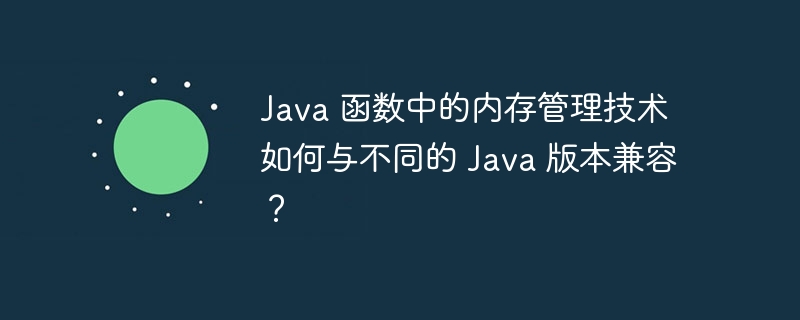
Java uses automatic garbage collection to manage memory. Different Java versions use different memory management technologies to improve performance and efficiency. Specific technologies include: Before Java 8: Concurrent Mark Sweep (CMS) garbage collector. Java 8: G1 garbage collector, introducing the concept of generation awareness. Java 11 and higher: ZGC (Z Garbage Collector), provides extremely low-latency garbage collection. Backward compatibility is important, and new versions are generally compatible with older versions, with exceptions: G1 is incompatible with Java 7, and ZGC is incompatible with Java 10 and earlier. Understanding memory management techniques in different versions can help optimize code and ensure that applications are compatible and stable across versions.

Memory management technology and version compatibility in Java functions
Java is a language that manages memory using automatic Garbage collection technology to remove objects that are no longer used. However, as Java versions continue to be updated, its memory management technology continues to evolve to improve performance and efficiency.
Memory management techniques in different Java versions
Compatibility Notes
While Java's memory management technology continues to evolve, backward compatibility is critical. Newer Java versions are generally compatible with older versions, but there are a few exceptions to this:
Practical Case
Consider the following application example using Java 8:
public class MemoryDemo {
public static void main(String[] args) {
// 创建大量对象,填满堆内存
List<Object> objects = new ArrayList<>();
for (int i = 0; i < 1000000; i++) {
objects.add(new Object());
}
// 触发垃圾回收
System.gc();
}
}When running this application in Java 8, Use the CMS garbage collector. If you run the same application using Java 11 and later, the G1 garbage collector will be used, potentially resulting in different performance behavior because G1 handles large heaps of memory more efficiently.
Conclusion
Memory management techniques in Java functions are continuously optimized to improve performance and efficiency. Although Java versions are constantly updated, maintaining backward compatibility is important to ensure that applications run stably on different versions. By understanding memory management techniques in different Java versions, developers can optimize their code to take advantage of the latest improvements while ensuring application compatibility and stability.
The above is the detailed content of How are memory management techniques in Java functions compatible with different Java versions?. For more information, please follow other related articles on the PHP Chinese website!
